In this the Anniversary of the First World War, there is much accent on the poetry of that war. Magnificent though it is, and worthy of being printed and re-printed, there is also a fine body of poetry of the Second World War that we should not neglect. This is unlike earlier war poetry, quieter, meditative and with a quiet intensity.

The Soldier Poets of World War II
by Maritravel
Where are the war poets? the newspapers asked on the outbreak of the Second World War. "Under your noses" said writer and critic Cyril Connolly. And so they were.
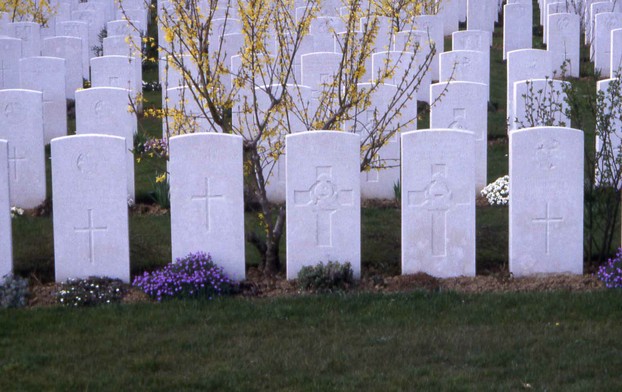 Upright White Marble Tombstones Mari Nicholson |
Overshadowed by the First World War Poets
Spanish Civil War to World War ll
Long over-shadowed by the First World War Poets, the poets of the Second World War came from a society that already knew about its horrors. Wilfrid Owen, Sigfried Sassoon, Isaac Rosenberg, Ivor Gurney, Robert Graves and others who were swept into the war of 1914-18 on a wave of patriotism and optimism felt that they spoke for a generation who had lost their innocence in the trenches and on the battlefields of France. They wanted to convey the truth as they saw it, not of a glorious sacrifice but of the harsh reality of war.
In contrast to the earlier poets, those of the Second World War came from a much changed society, one which already knew something of the awfulness of armed conflict. News of the civil war in Spain and the atrocities being committed there in the name of ideology were being published daily and there was a quiet fatalism in many parts of society as the threat of another European war loomed. The poets who came into this war entered with few illusions with many of them having an acute political and social conscience and aware of the need to fight fascism. .
John Cornford - Spanish Civil War
T.S. Eliot, W.H. Auden
Poetry had changed too. The Great War and the Depression had left their mark on everyone, poets not excepted. The Spanish Civil War of 1936-39 which had drawn many poets from the UK, Canada and the USA to fight in the International Brigades had introduced a fresh generation to a new kind of war - and a new way of writing poetry. John Cornford’s poem Letter from Aragon with its recurring sentence
… This is a Quiet Sector of a quiet front….
is a perfect example, and the poems of Auden, Stephen Spender, SylviaTownsend Warner, Ewart Milne and Laurie Lee are still anthologised.
T.S. Eliot and W.H. Auden had given a voice to a new generation of poets and the magazine, Penguin New Writing, played its part by introducing new and exciting ideas. Even so, when the Second World War broke out the question constantly being asked by newspapers searching for another patriotic Ruper Brooke figure was “Where are the War Poets”?
Cyril Connolly answered them with a curt “Under your nose”. And indeed they were, although they were writing poems very different from those written in and of The Great War. The new style was nonchalent, laconic and cool.
 Keith Douglas Google |  Keith Douglas Google |
Keith Douglas
Arguably the greatest poet of the Second World War
Among the most famous were Keith Douglas – arguably the greatest of the 1939-45 intake – Alun Lewis, Henry Reed and Alan Ross. Douglas wrote in a letter that he had never tried to write about ‘battles and things’ until he had experienced it himself, but when he did write about it, in the wonderful Vergissmeinnicht where he writes about the photograph in the wallet of a dead German he came across in a burned out tank in the desert, it is in words of searing honesty. It its honesty, it humanises the war.
In Gallantry he comes nearest to anger when he writes
… But the bullets cried with laughter, the shells were overcome with mirth ..
and in On a Return from Egypt, the last poem he wrote, he conveys the tragedy of war very powerfully, the poem a construct of imperfect rhymes (change/fringe, death/wraith) and line breaks.
The last line reads……… I fear what I shall find. Prophetic? He was killed by a mortar shell at the D-Day landings on June 9th, 1944.
 Alun Lewis Wikicommons |  Memorial to Alun Lewis - Wikicommons |
Alun Lewis
Alun Lewis, despite being anti-war, wrote in an almost muted style. An incredibly sensitive young man, he originally considered registering as a conscientious objector but his disgust and horror at what was happening in Europe eventually led him to believe that he should play his part and enlist as others had. March 1940, still confused, he enlisted in the army.
By mid-July he had been promoted to lance corporal and in October he wrote All Day it has Rained, his best known poem. In the poem, although he mentions the distresses and dreads of war the poem is telling in its depiction of the soldiers’ day-to- day existence and the drudgery of military life. The opening line
… All day it has rained, and we on the edge of the moors …
has an air of ennui, evoking a sense of lassitude, almost apathy, as have the words
….. thought indifferently ….. of loud celebrities exhorting us to slaughter….
before his abrupt move into demotic speech
…unbuttoning our braces, smoking a Woodbine, darning dirty socks…..
It is also a paean of praise to World War l poet Edward Thomas and the countryside he so loved, especially the Shoulder o' Mutton Hill in Hampshire which was a favourite walk of Thomas and which Lewis had also walked.
His style changed again when he was posted to Burma, a country he seems to have had trouble coming to grips with. The exoticism left him bewildered right up until he died there and by the end he could only see "his face distorted in a jungle pool". The persistence of the sun is felt throughout as is a sense of impending doom. Yet despite this he wrote what can only be considered some of the greatest poetry of the war.
He died, supposedly a suicide on March 5th, 1944.
Henry Reed
Henry Reed was not a prolific poet but he wrote what is often considered the most famous poem of the Second World War, a constant in the school curriculum. He never served abroad but worked in the Government Code and Cypher School where he translated Italian and Japanese signals. Naming of Parts comes from The Lessons of War and is a quiet meditative poem in which a recruit's thoughts wander from the army officer's instruction in Basic Training to very lyrical words conveying the beauty of nature all around him.
The contrast between the two worlds of the training session and the lushness of nature juxtaposes the two men, the officer who speaks in prosaic and boring terms of the mechanics of the rifle and the recruit who seems drunk with the beauty and sexuality of nature where the bees pollinate backwards and forwards.
 Alun Ross |
First and Second World War Poetry
The First World War produced poetry that still resonates down the years but the Second World War produced poetry that came from disillusion, a war spawned by what Auden called the low dishonest decade. Browsing in second-hand bookshops one will often come across little self-published books of poetry from World War II which can surprise with their richness of feeling.
Both wars produced poets who wrote with poignancy and compassion, both produced great poets and both had a few mediocre ones as well. What one gets from reading these poets is a sense of different wars and different decades. Although the poetry stands alone and can be enjoyed without its background, knowing something of the social history of the period between the wars is a help to an understanding of the poems of the second World War.
ENDS …..
Alan Ross
Poetry of the Arctic Convoys
Alas Ross, who served first as a minesweeper and then on the destroyers that accompanied the Arctic convoys safely through the seas, ended his service in Germany overseeing the break-up of the German fleet, de-nazification, the identifying of war criminals, and the Belsen Trials. These are poems of immense power, less well known than they should be, but then the Arctic Convoy servicemen always said they were overlooked in the war! If there is anger in them, it would appear to be anger more against nature than the human enemy but unlike Douglas and Lewis, he is not laconic nor is he nonchalant.
Ross was a man of letters, a journalist, editor and publisher, and it is often said that from the detail in the poems, his journalistic roots are obvious. From Survivors:
… The white faces float like refuse…. they clutch with fingers frozen into claws the lifebelts ….
are sentences that sear the mind, as does his longer poems describing the dark, heavy, seas, the perpetual cold and the fear of a torpedo attack leading to an icy grave that they lived with daily. They also paint a picture as vivid as a newspaper headline.
Bibliography
Much second world war poetry can be found in anthologies. Here is a list of useful books to read to introduce the war poetry of 1936-39 (Spain) and 1939-45 (Second World War).
Poems from Spain, ed. by Jim Jump (Lawrence & Wishart, London)
Spanish Civil War Verse, ed. by Valentine Cunningham (Penguin)
Poetry of The Thirties: ed Robin Skelton (Penguin)
The Terrible Rain: The War Poets 1939-1945, ed by Brian Gardner. (Methuen Paperback)
Poems of the Second World War: The Oasis selection. (Dent, London)
Alun Lewis: Collected Poems ed. by Cary Archard (Poetry Wales Press)
Alan Ross: Open Sea (London Magazine Editions)
Keith Douglas: The Complete Poems ed. by Desmond Graham (O.U.P.)
Sidney Keyes: The Collected Poems, ed. Michael Meyer. (Routeledge, London)n anthology of poetry from the thirtie
You might also like
Review of Walt Whitman's Leaves of GrassA review of Leaves of Grass, by Walt Whitman - Father of American Poetry
Siegfried Sassoon: Innocence Lost in the Trenches of the Grea...Decorated for bravery, Siegfried Sassoon changed the war poetry genre forever...
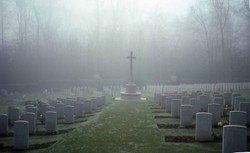

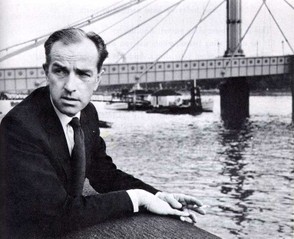

 The Alternative Picture Galleryon 04/20/2016
The Alternative Picture Galleryon 04/20/2016
 ROME - Where the Past Comes to Lifeon 03/26/2016
ROME - Where the Past Comes to Lifeon 03/26/2016
 Only in London - New Unique Guideon 01/25/2016
Only in London - New Unique Guideon 01/25/2016
 Manna, from Sicily, not from Heavenon 01/08/2016
Manna, from Sicily, not from Heavenon 01/08/2016
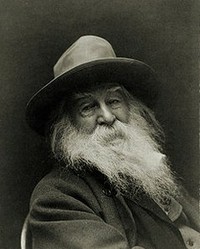
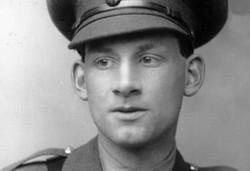
Comments
Keith Douglas can take his place up there with the soldier poets of WW1 and some of Alun Lewis's poetry is heartbreaking. Do read them, I know you'll enjoy the poetry.
The poets of the 2nd Word War had passed me by. Now inspired to read about their work and thier lives.
Sorry the article isn't better, but the copyright principle meant I couldn't write the piece I wanted. Unfortunately, the cut and paste I was left with is not very satisfactory, but I shall re-edit it next week and perhaps it will look better.
Before I read this, I'd have told you that I didn't know any WW2 poets. But I knew most of those. Thank you for educating me. <3
Thanks Kathleen. It was a bit difficult getting round the copyright. I would have liked to print more of the poetry but was advised not to because of exceeding the quotes that are allowed free.
I really enjoyed this piece, and have been introduced to poets I was completely unaware of before. Thanks!